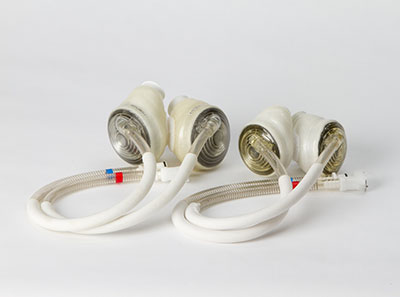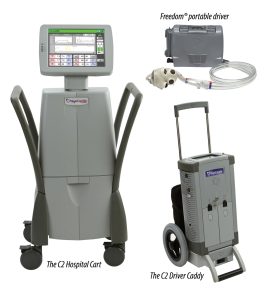Picard Medical, Inc. is a holding company that owns 100% of the membership interests of SynCardia Systems, LLC (“SynCardia”). A medical technology company based in Tucson, AZ, SynCardia manufactures and sells the only U.S. Food and Drug Administration (“FDA”), and Health Canada approved implantable total artificial heart (the “SynCardia TAH”). To date, over 2,100 SynCardia TAHs have been implanted in patients in 27 countries and the SynCardia TAH is an established bridge to heart transplantation for patients with biventricular failure in the U.S., and around the world.
Picard Medical plans to list on the NYSE American under the symbol PMI. Picard Medical filed confidentially on August 23, 2024. The Benchmark Company is the sole bookrunner on the deal. No pricing terms were disclosed in the S-1 filed with the SEC. According to Renaissance Capital, Picard Medical filed on April 1, 2025 with the SEC to raise up to $12 million in an initial public offering.

SynCardia Systems, LLC is the leader in the development of total artificial hearts. The Tucson, AZ-based company was founded in 1985. The Company markets and sells the SynCardia Total Artificial Heart (STAH), which is the only U.S. Food and Drug Administration (FDA) and Health Canada (HC) approved artificial heart. The STAH has been used by over 2,100 patients worldwide. and SynCardia booked $4 million in revenue for the 12 months ended December 31, 2024.
Saving Lives Today: The SynCardia Total Artificial Heart with an External Driver

50cc SynCardia TAH and 70cc SynCardia Total Artificial Heart
image courtesy of SynCardia Systems LLC
The currently available, FDA and Health Canada-approved, SynCardia TAH System consists of an implant (including left and right artificial ventricles), external pneumatic drivers to power the implant, and drivelines that connect the driver to the implant. The implantation procedure follows routine surgical techniques used by cardiothoracic surgeons performing heart transplants. The drivers powering the SynCardia TAH are available for in-hospital use (Companion 2) and or in-hospital and in-home use (“Freedom Driver”) and generate true pulsatile flow using a redundant pneumatic pump assembly. The core of the approved technology is its heart ventricles with blood contacting surfaces that already have over 2,100 implants’ worth of clinical experience.
50cc SynCardia TAH and 70cc SynCardia Total Artificial Heart
The principle of operation for the 50cc and 70cc SynCardia TAH is identical, and both implants are indicated for short-term support (i.e., bridge to transplant, “BTT”) for patients at risk of imminent death from biventricular failure who require cardiac replacement. The 70cc SynCardia TAH system is designed for implantation into adult patients and obtained the CE mark in Europe in 1999, followed by a Pre-Market Authorization (“PMA”) from the U.S. Food and Drug Administration (“FDA”) in 2004. As of today, the 70cc SynCardia TAH has supported 1,951 patients globally since 1985, including 311 patients who were supported as part of early feasibility studies and compassionate use. The 50cc version of the SynCardia Total Artificial Heart is for use in smaller adult patients and in the pediatric patient population. The 50cc SynCardia TAH obtained the CE mark in 2014, followed by a PMA approval in 2020. As of today, the 50cc SynCardia TAH has supported 122 patients globally since 2014.
External Drivers

The Companion 2 Driver, which can be docked in the Hospital Cart or Caddy, powers the SynCardia Total Artificial Heart from implant until the patient’s condition stabilizes. Once stable, patients who are eligible can be switched to the smaller, wearable Freedom(R)portable driver. (PRNewsFoto/SynCardia Systems, Inc.)
SynCardia currently has two approved external drivers for use with the SynCardia TAH implant, the Companion 2 (“C2”) Driver and the Freedom Driver.
The C2 Driver, which secured a CE Mark in Europe in 2011 and obtained FDA approval in 2012, is a mobile, external pneumatic driver intended for in-hospital use. The C2 Driver has replaced the original “Big Blue”, which is no longer offered for sale. The C2 Driver includes a hospital cart/caddy, and drivelines connect the driver to the implant. Patients implanted with the SynCardia TAH are initially connected to a the C2 Driver during a period in which they are postoperatively stabilized. Once a patient becomes clinically stable and, in certain cases, ready to be discharged from the hospital, the patient is moved to the portable Freedom Driver.
The Next Generation STAH: the Emperor System
Starting in 2023, SynCardia began the development of a fully implantable total artificial heart codenamed “Emperor”. The Emperor system will be powered by small mechanical drivers connected to the artificial ventricles and thus eliminate the need for external pneumatic drivers. This new fully implantable system will utilize our FDA-approved artificial ventricles, which have been implanted in over 2,100 patients to date. According to Picard Medical’s S-1, multiple prototype iterations of the Emperor have been built and the pulsatile flow rate has been tested using the same techniques and equipment that the on-market SynCardia TAH is tested with. These prototypes have been shown to achieve pulsatile flow with rates exceeding the minimum requirement of 3.5 liters per minute and meeting or exceeding the average flow rate of 5.6 liters per minute of cardiac output, as measured in liters per minute, that match our on-market SynCardia TAH. ~2.5–3.0 liters per minute is generally considered the lowest viable cardiac output before perfusion becomes critically inadequate, potentially leading to shock.3,4 This higher minimum keeps the SynCardia TAH consistently above that range. These early prototypes have also shown high durability and low energy consumption. This technology has extensive intellectual property coverage, including the newly awarded U.S. patents No. 11,918,798 and No. 12,121,711 B2 and, recently, the China National Intellectual Property Administration granted patent application No. 202080094390.7 covering this technology. SynCardia expects to perform first-in-animal trials of the system in the first half of 2025. Depending on the outcomes of these studies and other non-clinical testing, the company may be able to seek FDA approval for Emperor in 2028.(Source: Picard Medical, Inc. S-1)
Disclosures:
- Please see the full S-1 for more information and forward looking statements.
- SynCardia Systems, LLC is a member of the Arizona Bioindustry Association, Inc. (AZBio)
